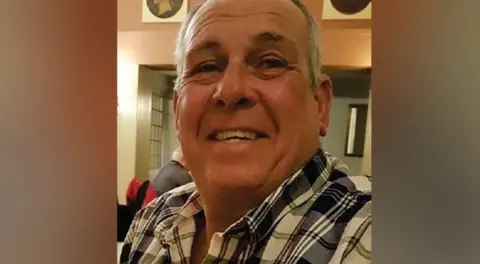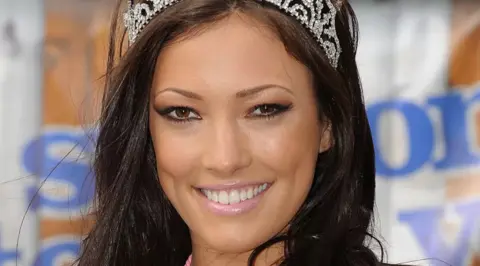
 Shutterstock
ShutterstockFive years after ITV’s most popular yet controversial daytime programme was axed following the death of a guest, an inquest has concluded there was “no causal link” between Steve Dymond’s appearance on The Jeremy Kyle Show and his suicide.
The programme was abruptly cancelled in 2019 after the 63-year-old was found dead.
Just a week earlier, he had been filming for the show, during which he failed a lie detector test.
The confrontational show, which ran for 14 years, often featured family members, partners and exes attempting to solve disputes involving issues like access to children, break-ups, relationships, parenting and addictions.
Kyle adopted a more combative style than his US counterpart Jerry Springer, and would often berate participants in front the live audience.
Mr Dymond’s inquest heard that he had been left “broken” and “distraught” after filming, and that Kyle had told the guest to “grow a pair” and that he “wouldn’t trust you with a chocolate button”.
He also egged on the audience to “boo him” after Dymond failed a lie detector test that was intended to reveal whether he had cheated on his partner.
However, the presenter denied humiliating his guest, and on Tuesday the coroner ruled that his treatment of Mr Dymond was not a “contributory factor” to the death.
The coroner noted Mr Dymond’s “mental distress”, but said the Jeremy Kyle Show could not be seen as a “direct cause of Steve Dymond’s distress”.
The inquest heard that Mr Dymond had a history of suicide attempts, having taken overdoses three times previously. He had also been diagnosed with both a depressive and a personality disorder.
Coroner Jason Pegg did not completely dismiss the role played by the TV show, though, saying it was “one of a number of factors”. He added: “Whilst possible that the manner of his experience added to his distress, it is not probable.”
Kyle said he had been “exonerated” by the coroner’s ruling.
At the time, Mr Dymond’s death shone a harsh spotlight on the show’s style and raised questions about ITV’s duty of care procedures.
The Jeremy Kyle Show had been in the headlines before, with a judge describing it in 2007 as “human bear-baiting which goes under the guise of entertainment”.
In 2014, media regulator Ofcom upheld a complaint relating to the treatment of a 17-year-old girl who was called a “crackhead” and a “silly anorexic slapper” by her older sister on air.
Mr Dymond’s death led to a public outcry, and ITV bosses were called to answer questions in front of the House of Commons culture select committee.
The committee’s then-chair Damian Collins MP labelled the producers “irresponsible” and said their lack of expert knowledge was “astonishing”.
The show’s use of lie detectors to solve issues like infidelity, addiction and family feuds came under particular scrutiny.
Executive producer Tom McLennan admitted to the committee that the polygraphs used were “not 100% accurate”, and that he did not know how reliable they were.
“We know the show was controversial,” Mr McLennan rold the committee. “But we did take our duty of care very seriously.”
 Family handout/PA Media
Family handout/PA MediaThe inquest heard from ITV executives who said Mr Dymond was subject to “continuous assessment” following his acceptance to be on the show, and was offered eight to 10 sessions of cognitive behavioural therapy for self esteem and confidence building after the show.
And following the coroner’s verdict, ITV said the findings confirmed the show had “comprehensive duty of care processes covering the selection of contributors who appeared on the show and their care both during and after filming”.
Dr Charlotte Armitage, a specialist psychologist in film and TV, says that sometimes “no amount of psychological care can mitigate against a format of a production that lends itself to psychological risk”.
She says there was always a “question surrounding the ethics of the programme’s format”.
Following the fallout from Mr Dymond’s death, Ofcom, the UK’s broadcasting regulator, announced new rules to protect those taking part in TV shows.
The 2021 guidelines focused on ensuring that vulnerable individuals, particularly those suffering from mental health issues, are properly supported before, during, and after their time on television.
Greater responsibility must also be taken for the wellbeing of participants off air with services like counselling and medical support being offered.
Dr Armitage wants to see even more updated guidance which includes an “official clinical training programme to be created for TV mental health practitioners so that practitioners can be trained specifically on how to deliver psychological care in this unique environment”.
 Getty Images
Getty ImagesThe Jeremy Kyle Show was one of a number of programmes that led the TV industry to move towards tighter rules.
In 2021 Love Island said contestants were to be taught how to handle the “potential negativity” of social media.
The revised set of welfare measures came after the suicides of former contestants Sophie Gradon and Mike Thalassitis in 2018 and 2019 respectively.
Some entertainment shows like Made in Korea have made welfare a priority – the boys on the talent show had support workers living with them who were available 24/7.
Other shows like Strictly Come Dancing are still grappling with issues around welfare following complaints about the behaviour of two former professional dancers during training.
The BBC dance show has now announced that a member of production staff will be present in all future rehearsals and there will be two new dedicated welfare producers, as part of a string of extra measures.
Five years on from the death of Steve Dymond, Dr Armitage says improvements are being made, but “there is still a way to go in ensuring support is offered at the right level across the industry”.



Be the first to comment